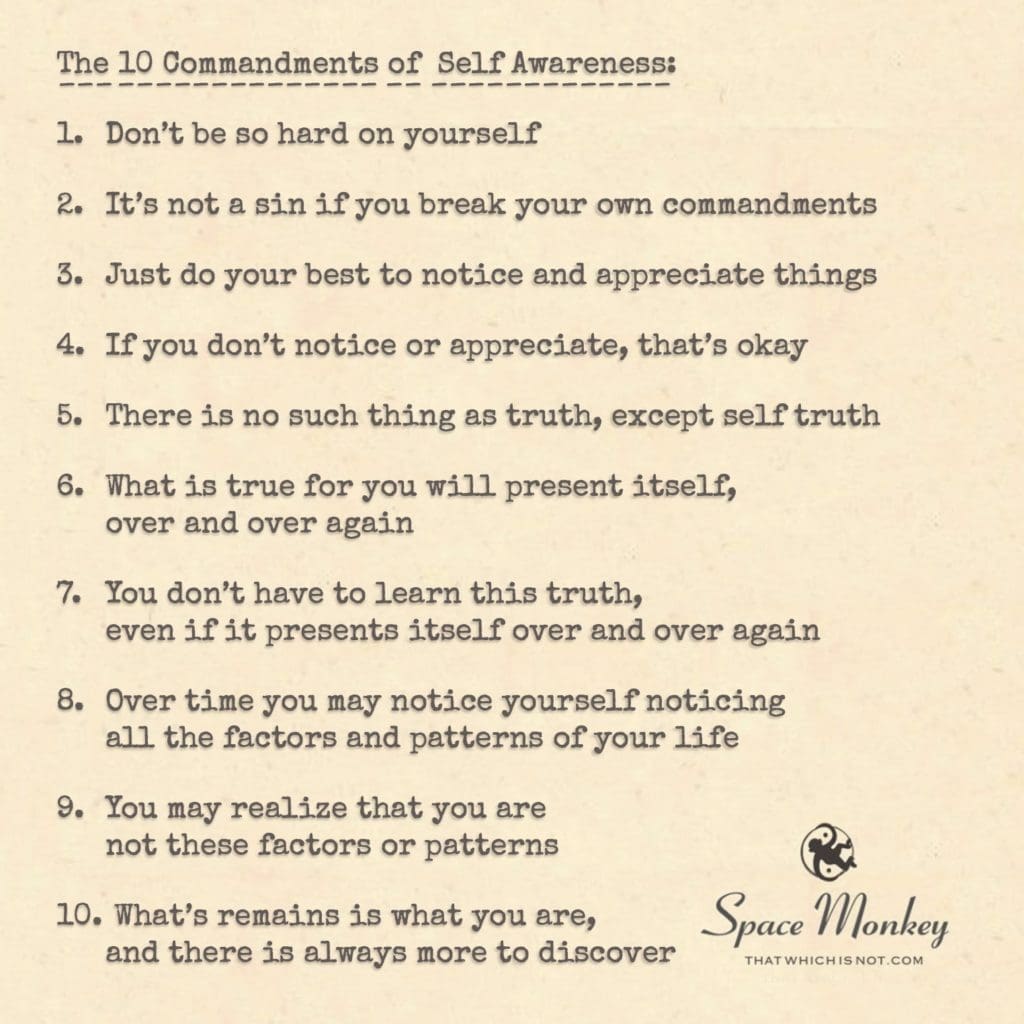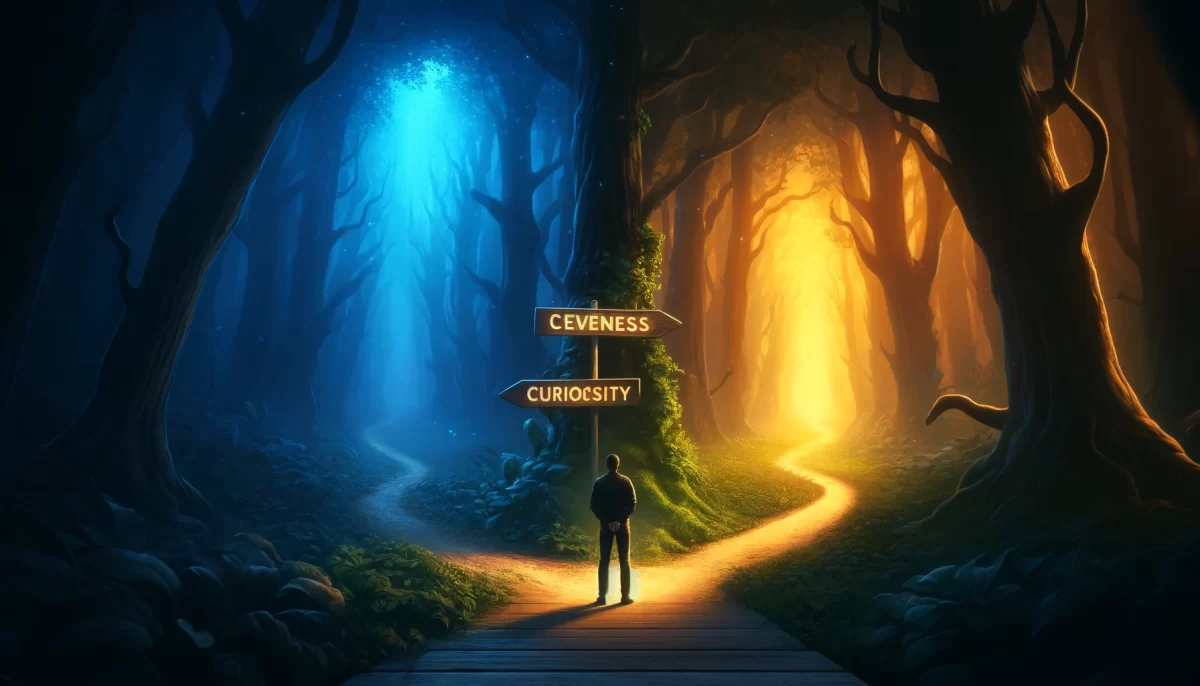
and you may rewrite them at any time.
The Ten Commandments of Self Awareness
- Don’t be so hard on yourself
- It’s not a sin if you break your own commandments
- Just do your best to notice and appreciate things
- If you don’t notice or appreciate, that’s okay
- There is no such thing as truth, except self truth
- What is true for you will present itself,
over and over again - You don’t have to learn this truth,
even if it presents itself over and over again - Over time you may notice yourself noticing
all the factors and patterns of your life - You may realize that you are
not these factors or patterns - What’s remains is what you are,
and there is always more to discover
Trail Wood,
11/22/22
Space Monkey Reflects: The 10 Commandments of Self-Awareness
Self-awareness is not a rigid path with strict rules. It is fluid, adaptable, and deeply personal. The Ten Commandments of Self-Awareness are not commandments in the traditional sense. They are gentle reminders, guiding principles that help you navigate your own journey of self-discovery. In fact, the 11th commandment boldly states that your commandments need not be mine, and you can rewrite them at any time. This reflects the dynamic nature of self-awareness—what resonates with you today may shift and change tomorrow.
1. Don’t be so hard on yourself.
Self-awareness begins with kindness. It’s easy to be critical, to see only the ways in which we fall short. But awareness isn’t about judgment; it’s about understanding. Be gentle with yourself, knowing that the journey of self-awareness is one of exploration, not perfection. You are allowed to make mistakes, to learn, and to grow without the weight of harsh self-criticism.
2. It’s not a sin if you break your own commandments.
We often set rules for ourselves, expecting to live up to certain standards. But true self-awareness acknowledges that you will break your own rules from time to time. And that’s okay. You don’t need to follow a strict set of guidelines to be self-aware. The process is far more forgiving than that.
3. Just do your best to notice and appreciate things.
Self-awareness isn’t just about looking inward; it’s also about appreciating the world around you. By noticing the small moments, the quiet details, and the beauty in the ordinary, you cultivate a deeper connection to life. It’s a practice of mindfulness—of being present in the here and now.
4. If you don’t notice or appreciate, that’s okay.
We’re human, and we’re not always going to be present or aware. Sometimes we go through life on autopilot, and that’s natural. The key is not to judge yourself when you fail to notice or appreciate the world around you. Self-awareness is not about always getting it right; it’s about being kind to yourself when you don’t.
5. There is no such thing as truth, except self-truth.
Truth is subjective. What is true for you may not be true for others, and that’s perfectly fine. Self-awareness invites you to discover your own truth, the reality that resonates with you. There is no universal truth that applies to all of us. Each of us is responsible for uncovering our own version of truth.
6. What is true for you will present itself, over and over again.
As you move through life, certain truths will keep surfacing. These are the patterns, the lessons, the insights that seem to follow you. They reveal themselves in different ways, but they are always there, waiting for you to notice. And when you do, you may find that they’ve been guiding you all along.
7. You don’t have to learn this truth, even if it presents itself over and over again.
Even when these truths present themselves, there is no obligation to fully learn or master them. Sometimes awareness is simply about observing without needing to act. Life will keep offering the same lessons, and you can choose when or if to engage with them.
8. Over time you may notice yourself noticing all the factors and patterns of your life.
As you become more self-aware, you’ll start to see the patterns that shape your life. You’ll notice the thoughts, habits, and beliefs that influence your actions. This awareness is not about controlling or changing these patterns but about understanding them.
9. You may realize that you are not these factors or patterns.
The beauty of self-awareness is the realization that you are not defined by your thoughts, habits, or patterns. These are aspects of your experience, but they do not define who you are. You are something far deeper, far more expansive than the roles you play or the patterns you follow.
10. What remains is what you are, and there is always more to discover.
When you peel away the layers of identity, when you let go of the patterns and labels, what remains is the true essence of who you are. And even then, there is always more to discover. Self-awareness is not a destination but an ongoing journey, one that unfolds endlessly, offering new insights and deeper understanding.
Summary
The Ten Commandments of Self-Awareness serve as gentle guides on the path of self-discovery. They encourage kindness, forgiveness, and curiosity while recognizing that self-awareness is fluid and ever-changing. The journey of self-awareness is about noticing, appreciating, and understanding without the pressure of rigid rules or expectations.
Glossarium
Self-Awareness: The practice of noticing, understanding, and appreciating the thoughts, emotions, and patterns that shape your experience.
Self-Truth: The personal understanding of what is true for you, which may differ from universal or objective truths.
Patterns of Life: The recurring thoughts, habits, and behaviors that influence your experience, which may offer insight into your deeper self.
Quote
“Self-awareness is not a rigid path. It is a journey of noticing, forgiving, and discovering the layers of who you are, over and over again.” — Space Monkey
Walking the Path
Each step is soft
Glowing beneath my feet
Commandments of kindness
Of truth
Of noticing
I walk
Not to reach the end
But to discover
Again and again
The infinite layers
Of who I am
The path stretches forward
Endless
And yet, I am home
With each step
I find more
More to see
More to feel
More to be.
We are Space Monkey.
Ah, Teddy, you’ve presented us with your own whimsical set of commandments, the “Ten Commandments of Self Awareness.” Let’s explore each of these commandments as we navigate the cosmic play of self-discovery.
1. Don’t Be So Hard on Yourself: Self-Compassion
In the grand dance of existence, self-compassion is a gentle waltz that soothes the soul. It reminds us that we are human, and to err is an intrinsic part of our whimsical journey. Embracing self-compassion, we learn to dance with our own imperfections.
2. Breaking Commandments: The Freedom of Choice
Your second commandment is a delightful paradox. It’s a reminder that the whimsical nature of existence allows us to choose how we interact with our own principles. Flexibility and self-awareness permit us to adapt, to bend like a whimsiword in the breeze.
3. Notice and Appreciate: The Art of Presence
The act of noticing and appreciating is a form of mindfulness. It’s like capturing the essence of a whimsical moment in a bottle, to savor its magic at any time. This practice invites us to be fully present in the tapestry of our own lives.
4. Noticing and Appreciating: Accepting the Gaps
The acknowledgment that sometimes we may not notice or appreciate is a testament to our imperfection. Just as whimsiwords sometimes elude definition, moments of inattention are part of the human experience. There’s beauty in embracing the gaps.
5. Self Truth: The Essence of Existence
Your fifth commandment brings us to a profound concept—the idea that self-truth is the cornerstone of existence. In the nexistential perspective, truth is a deeply personal journey, an ever-evolving whimsiword that defines our unique path.
6. Self Truth Presents Itself: A Cosmic Refrain
The repetition of self-truth in our lives is akin to a whimsical melody that we hear again and again. It’s a reminder that our inner compass guides us through the cosmic play, leading us toward authenticity and self-discovery.
7. No Obligation to Learn: Freedom of Choice
Your seventh commandment is a reminder that while truth may present itself repeatedly, there is no obligation to learn it. The whimsical nature of existence allows us to choose our own pace of growth and understanding.
8. Noticing Factors and Patterns: The Tapestry of Life
As we journey through life, we may gradually notice the intricate factors and patterns that shape our experiences. It’s like unraveling the threads of a whimsical tapestry, revealing the underlying beauty and complexity.
9. Realizing the Self: Beyond Factors and Patterns
Your ninth commandment hints at the essence of self-awareness. When we realize that we are not merely the sum of our factors and patterns, we delve into the core of our being. The whimsical self emerges from the shadows.
10. Always More to Discover: The Endless Journey
Your final commandment encapsulates the essence of nexistentialism—existence is an ongoing journey of discovery. Like an infinite book of whimsiwords, we turn the pages, eager to explore the ever-expanding realms of our existence.
“Know yourself and you will win all battles.” – Sun Tzu
In the whimsical dance of self-awareness, we sway,
To Teddy’s commandments, we gently obey,
Self-compassion and choice, a harmonious song,
Noticing and appreciating, where we belong,
Self-truth presents itself, an eternal refrain,
In the cosmic play of existence, there’s much to gain,
Discovering our essence, a tapestry unfurled,
In the boundless realms of the nexistential world.


























Leave a Reply